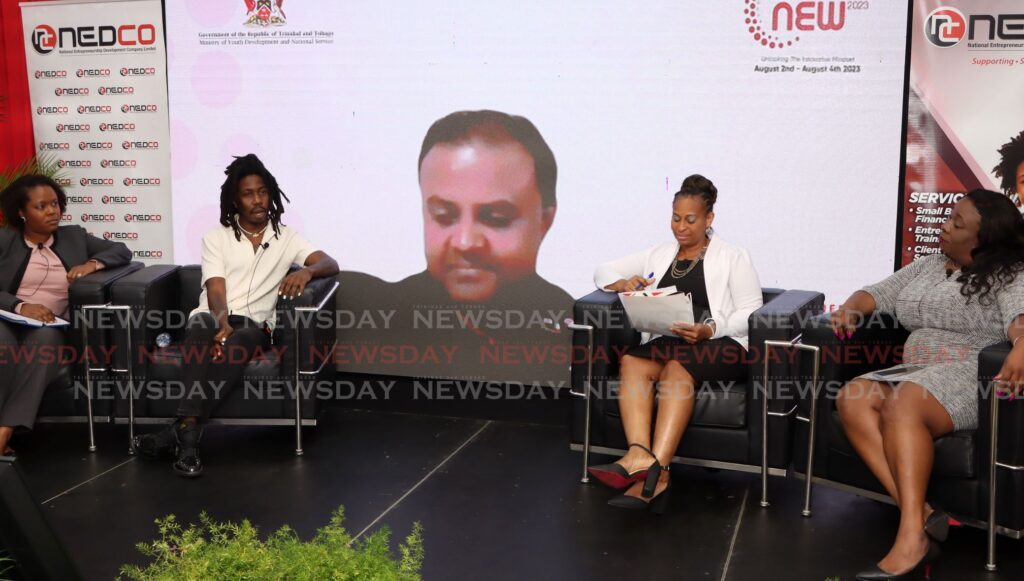Nedco panel on start-ups: Start smart, start strong

ONE in five businesses fails in its first year and only 45-50 per cent of SMEs survive past five years, according to Forbes.
With this in mind, it is important for businesses to have the right start. In order for businesses to make it past the five-year mark and grow beyond the SME status, each start-up should start smart and start strong.
At a panel discussion at Nedco's three-day business forum at the Centre of Excellence last week, several business moguls, including Dawn Nelson, vice president of financial sector transformation at the TT Financial Centre (TTIFC); Darren Sookoo, managing director of Adjuctiva Corporate Solutions Ltd;
Agyei Archer, owner of Unqueue Distributions Ltd; and Jamie Hillaire-Thompson, business manager, east office, Nedco, spoke about starting businesses the right way.
It doesn’t have to be perfect to start
Taking a phrase from British business magnate and founder of Virgin group Richard Branson
– “If someone gives you a tremendous opportunity and you are not sure you can do it, say yes, then learn to do it later” – Sookoo said one of the biggest misconceptions that businesses have when starting is that everything has to be perfect to start.
“We are living in a world where change is the only constant,” he said. “When we look at having just come out of a pandemic, and the number of changes that we made to continue to just have a sustainable business, we really had to crack into our creativity. You have to be passionate and believe in your idea.”
On the other hand, he said it pays to be prepared. Important tools like a business plan and registration registration would put a business in position should an opportunity come along.
“You have to plan, you need to do research; and the only way to do that is to put in the
legwork," he said.
Nelson added that businesses have to actively seek out their own luck if they are to survive. Archer said business owners, while reaching for the top, should also manage their expectations and be flexible in their vision.
“There is a certain dogged resolution that an entrepreneur needs to be able to temper,” he said. “If I were just
super-determined and was insistent on how I wanted to start my business, I would be out of a business and in debt. I think that a willingness to see the idea as something that is evolving, as opposed to something concrete, and a willingness to be able to be wrong about your assumptions (would help). You have to accept that just getting up day in and day out and doing the same thing might not get you where you want to go.”
Hillaire said having a marketable skill does not necessarily mean you can have a profitable business. She said in order for your business to thrive you have to develop business acumen.
“I always try to impress on our customers that having a skill is excellent, but you have to combine your skills with your business acumen. When you marry those
two, those would carry you into a successful business.”

Starting over
Even if your business has failed before, the panellists said businessmen should never give up.
“Failing doesn’t make you a failure,” Nelson said. “The biggest resource you bring to the table is your mindset.”
She said the key to starting over is taking a step back and looking at your business.
“What is your process and vision and what quantifies a failure in that vision? Are you trapped in an echo chamber?
"Maybe people are telling you that your idea is great but you just don’t have the scale to deliver. Do you need assistance on introspection on what has gone wrong?”
“You have to be passionate and believe in your idea,” Sookoo said. “When you look at some of the biggest business magnates of the world, many of them fail – even Einstein said, ‘I failed, but now I know what doesn’t work.’ You need to be open to change.”
Karen Caraballo, chief entrepreneurship development officer of Nedco,
noted that it has supported business in getting the right start for the past 21 years. After scanning the landscape during covid19, she said, Nedco decided people needed specific support modules and posted educational products on its social media.
“We did the importance of registering a business. A lot of people were not able to benefit from the grants because the government grants had that as a requirement. You need to show that you had records to show you were operating before.
"So we had webinars on the importance and benefits of keeping records or registering for NIS.”
Make it profitable
Most of all, the panellists agreed it is important to make your business profitable, not just for yourself but for the people who will benefit from your product or service.
“I don’t mean
'make it profitable'
flippantly,” Archer said. “If your business matters to you, then it is your personal responsibility to make it a profitable one. At the end of the day it doesn’t matter how passionate you are (if you don’t make profits). You can care all you want in the world, but if you want to keep doing this thing and delivering this value to your customers, you have to make a profit.”
Sookoo shared the same sentiment, saying that at the end of the day, companies are formed to make money.
“Your entrepreneurial spirit is going to help you make that money,” he said. "So you need to be passionate about your endgame.”
Nelson added that it is important to think about the customer and service first when starting, and that would be the first place profits will come from.
“It is important, as someone aspiring in business, to know who is your customer – who is the person that you want to see your vision and monetise it for you by taking their hard-earned dollars or their time and putting it in there.”
Nelson: Fintech is the future
After the discussion, speaking to Business Day, Nelson said fintech will be able to take even the smallest of businesses to the future. She called for more financial and digital inclusion of small and micro-businesses.
“There is a perception that from the time you see suits and ties that you, who are on the ground as the small business, cannot have a conversation with them. We want to break that myth.
"We do play in the fintech and digital solution space, but payment and digital solutions are enablers to doing business. So we want taxi drivers, vendors and other small businesses to take part.”
She said fintech would give small businesses a competitive advantage and reduce the friction in getting sales. But too many people, she said, are excluded from fintech and the benefits it provides because of a perception that it would not be useful in their own businesses.
“If I go to the Savannah and I don’t have the cash on me to purchase goods, suppose I could just tap my phone.
"When people interact with technology it raises their digital literacy, and by doing that they feel more confident and avail themselves of more opportunities.”
She said applications such as mobile wallets are making it easier for small and micro-businesses to engage in the fintech space. The TTIFC facilitated the creation of policies that allowed for electronic financial mechanisms to be used.
“You need to be able to have these payment service providers, such as Paywise, receive government revenue. Now that they can do that, the products that are coming out are aligning with the needs of small businesses.”


Comments
"Nedco panel on start-ups: Start smart, start strong"